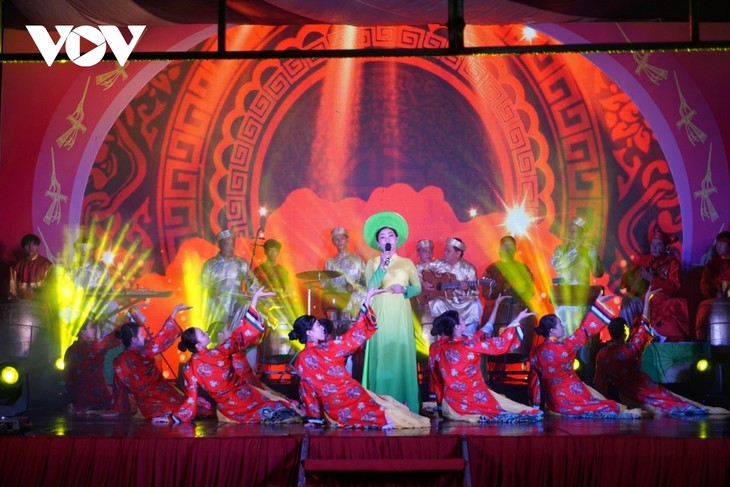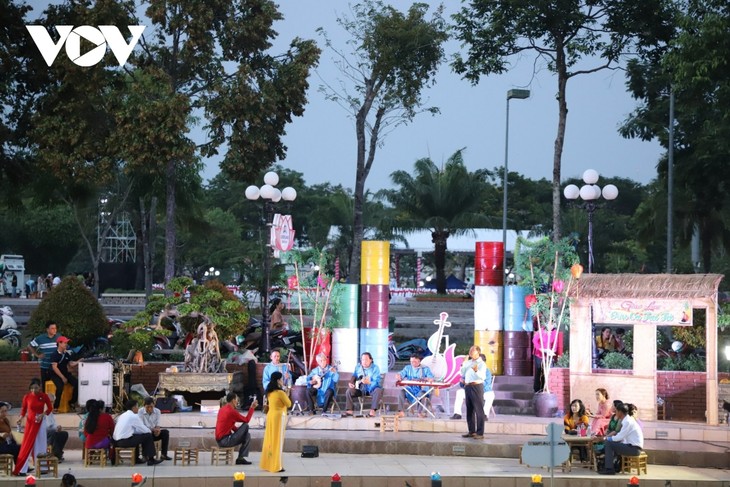(VOVWORLD) - Don Ca Tai Tu (amateur music) from southern Vietnam was officially recognized by UNESCO as an Intangible Cultural Heritage of Humanity in 2013. The Mekong Delta province of Dong Thap has made its greatest effort to preserve and promote this music genre as a tourism product.
 Artists from Cao Lanh city participate in a Don Ca Tai Tu and Dong Thap chanting festival organized by Dong Thap province’s Department of Culture, Sports, and Tourism. (Photo: VOV) Artists from Cao Lanh city participate in a Don Ca Tai Tu and Dong Thap chanting festival organized by Dong Thap province’s Department of Culture, Sports, and Tourism. (Photo: VOV) |
Cao Lanh city, the capital of Dong Thap, now has 37 Don Ca Tai Tu clubs with more than 400 members. Every Saturday evening, Don Ca Tai Tu is performed at Hai Ba Trung park in Cao Lanh city by the club members including artist Mai Thanh Loan.
“I have had a great passion for Don Ca Tai Tu since I was young. I practiced my favorite songs for pleasure as well as for singing contests,” said Loan.
Emeritus Artisan Thu Ba, the head of Cao Lanh city’s Don Ca Tai Tu club, has sung this music genre for 45 years. She said, “During the last 2 years Don Ca Tai Tu has become increasingly popular in Dong Thap. We have encouraged clubs in Dong Thap province to popularize this kind of art form. I, myself, am teaching local children Don Ca Tai Tu to conserve and promote it.”
The local authorities have created the best possible conditions for Don Ca Tai Tu to flourish. Ms. Ngo Thi Thanh Xuan, Vice Chairwoman of Ward 6’s People’s Committee, Cao Lanh city, said, “Our ward has a Don Ca Tai Tu club. There are exchanges with other clubs every week. We are doing everything possible to help them operate and develop.”
 Don Ca Tai Tu is performed at Van Mieu park in Cao Lanh city, Dong Thap province. (Photo: VOV) Don Ca Tai Tu is performed at Van Mieu park in Cao Lanh city, Dong Thap province. (Photo: VOV) |
Dong Thap province has opened more training courses and organized contests to popularize this art form. Don Ca Tai Tu performance has become an integral part of the province’s cultural events and festivals.
“We will recommend Cao Lanh city to make Don Ca Tai Tu part of its yearly working agenda and create a playground for artisans to exchange and gain new experiences. The center will also serve as a bridge to connect Don Cai Tai Tu clubs and promote this art form inside and outside Dong Thap,” Ngo Hoang Viet, Deputy Head of the Centre for Culture, Sports, and Radio Broadcasting in Cao Lanh city, said.
Dong Thap aims to open more Don Ca Tai Tu clubs from now to 2025, organize a Don Ca Tai Tu and folk singing festival every year, and publish a book collection on Don Ca Tai Tu and Dong Thap chanting.